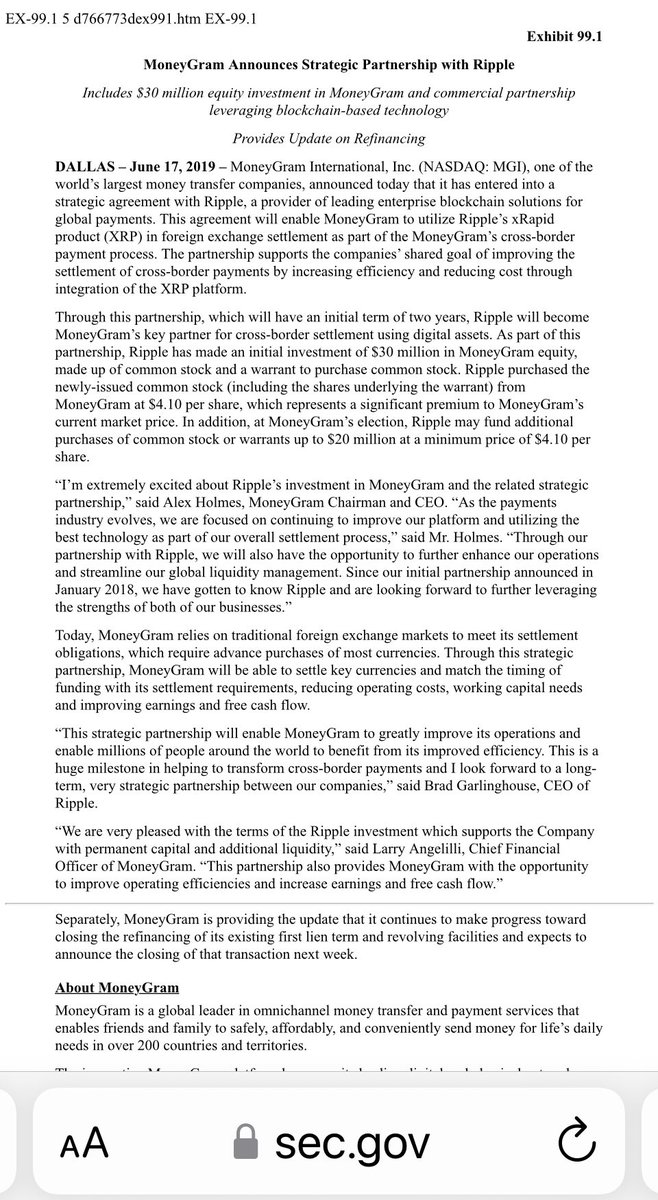After Coinbase listed #XRP in late February 2019, @MoneyGram filed a notice with the SEC and read what it said:
“This agreement will enable MoneyGram to utilize Ripple’s xRapid product (XRP) in foreign exchange settlement as part of the MoneyGram’s cross-border payment process.”
“This agreement will enable MoneyGram to utilize Ripple’s xRapid product (XRP) in foreign exchange settlement as part of the MoneyGram’s cross-border payment process.”

If #XRP was itself an illegal security the way the SEC now claims, why would the SEC allow this MoneyGram partnership 18 months before Clayton dropped the lawsuit on his last full day at the SEC and the very next day after meeting with @GaryGensler? 🤔
According to the SEC’s absurd theory, the #XRP that MoneyGram sold through exchanges like Coinbase to the public were also investment contracts w/Ripple even if the purchaser never heard a company called Ripple that sold software to banks.
In June 2019 MoneyGram told the SEC it was acquiring and selling XRP and it wasn’t an issue. In fact, we learned the SEC instructed MoneyGram how to report XRP on the books, as a contra expense.👇
🤔 In the 76 years since Howey, there’s no case where contra expense = a security.
🤔 In the 76 years since Howey, there’s no case where contra expense = a security.

Coinbase & MoneyGram’s use of #XRP wasn’t he only events in 2019. FSOC’s 2019 annual report HIGHLIGHTED #XRP along with #BTC , #ETH and #LTC. Look who signed it. 👇
The report said #BTC, #ETH, #XRP, and #LTC grew in market share significantly.
It didn’t mention securities.
The report said #BTC, #ETH, #XRP, and #LTC grew in market share significantly.
It didn’t mention securities.

Hinman’s Speech was June 14, 2018. As you know he didn’t mention #XRP in his speech - only gave #BTC and #ETH a free pass. (We don’t know about the Drafts or emails).
But there’s a Howey #XRP Memo 📝 written by SEC Enforcement Lawyers dated the day before: on June 13, 2018. 🤔
But there’s a Howey #XRP Memo 📝 written by SEC Enforcement Lawyers dated the day before: on June 13, 2018. 🤔
We haven’t read it b/c Judge Netburn said it was privileged. Judge Netburn informed us, however, that no recommendation was made at the conclusion of the XRP Memo. If SEC enforcement lawyers had determined that XRP was clearly a security, they would’ve recommend action be taken.
At a minimum, they would’ve recommended that a Cease & Desist letter be issued to Ripple. If Ripple refused, then an enforcement action. They are called enforcement lawyers - if it was clear that the law was being broken, they wouldn’t say “just let them get away with it.”
Most likely, because they didn’t conclude XRP was clearly a security. At best for the SEC, they likely needed more info. But remember, in 2015, Ripple settled w/FinCEN & the DOJ and was providing the Government with regular audits of all XRP sales. That’s 3 years of info to 2018.
Also consider, on January 1, 2020 Bailard Inc, a market participant, filed an ethics disclosure w/the SEC that said when it comes to crypto don’t worry b/c Bailard will only deal with the 3 Crypto assets generally accepted in the market as NON-SECURITIES: #BTC, #ETH and #XRP. 

Now also consider that in October 2020 - less than 60 days before Ripple was sued - the SEC informed the public (the people it supposedly protects) that the SEC had never determined #XRP to be a security. 

Let’s not forget, that @bgarlinghouse @JoelKatz met with the SEC in August/September of 2018 with Clayton and Hinman. Garlinghouse spoke up and out and said:
“@Ripple is living in purgatory because of the lack of regulatory clarity regarding #XRP.”
“@Ripple is living in purgatory because of the lack of regulatory clarity regarding #XRP.”
This meeting was several months after the June 13, 2018 #XRP Memo 📝 and the Hinman Speech giving #BTC and #ETH clarity by declaring a regulatory free pass for the two top tokens.
Hinman and Clayton did NOT reply to the Ripple CEO by saying: “#XRP is a security. That’s why.”
Hinman and Clayton did NOT reply to the Ripple CEO by saying: “#XRP is a security. That’s why.”
Had the Memo 📝 found #XRP clearly a security, they could have handed it to the CEO and CTO of Ripple and said here, read this! But they didn’t. Instead, Clayton said: “ok just keep talking to the staff about it at future meetings” or words to that effect.
I won’t even get into the conflicts.
So, say what you want about it, but to claim Ripple’s FND is totally without merit like @JohnReedStark and others, requires one to ignore both the facts and the law. You can argue that it won’t ultimately prevail, but it’s not meritless.
So, say what you want about it, but to claim Ripple’s FND is totally without merit like @JohnReedStark and others, requires one to ignore both the facts and the law. You can argue that it won’t ultimately prevail, but it’s not meritless.
• • •
Missing some Tweet in this thread? You can try to
force a refresh

 Read on Twitter
Read on Twitter




